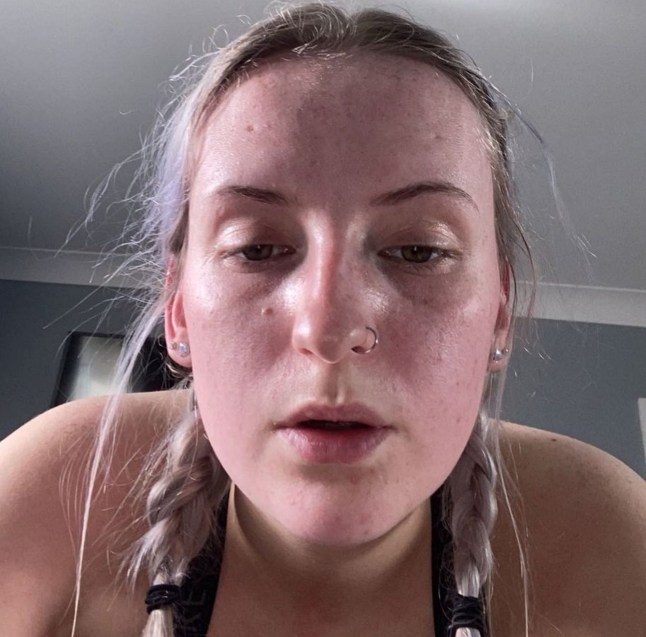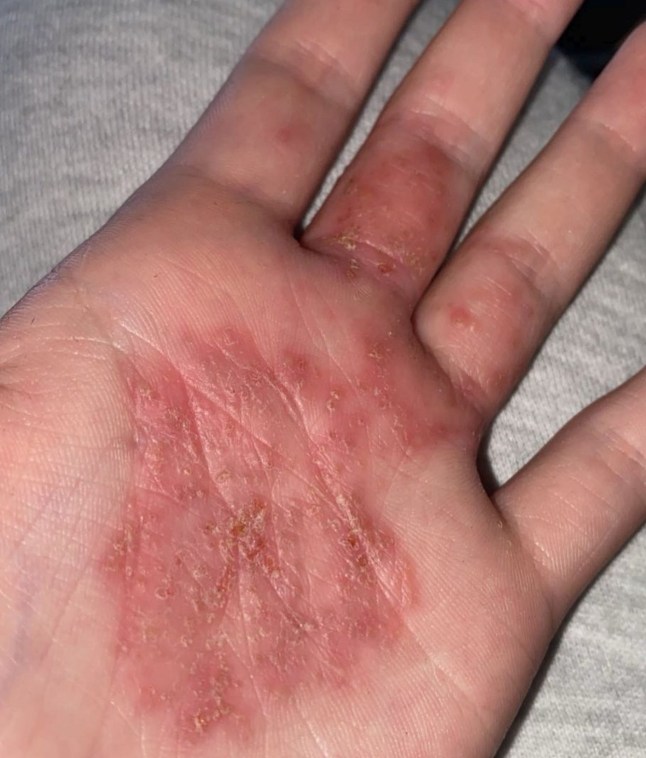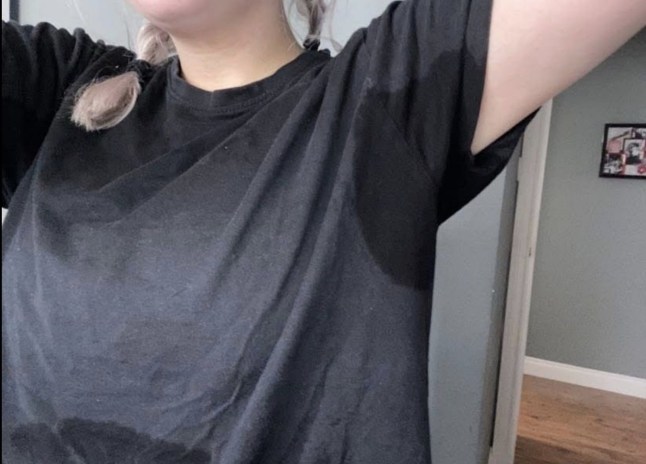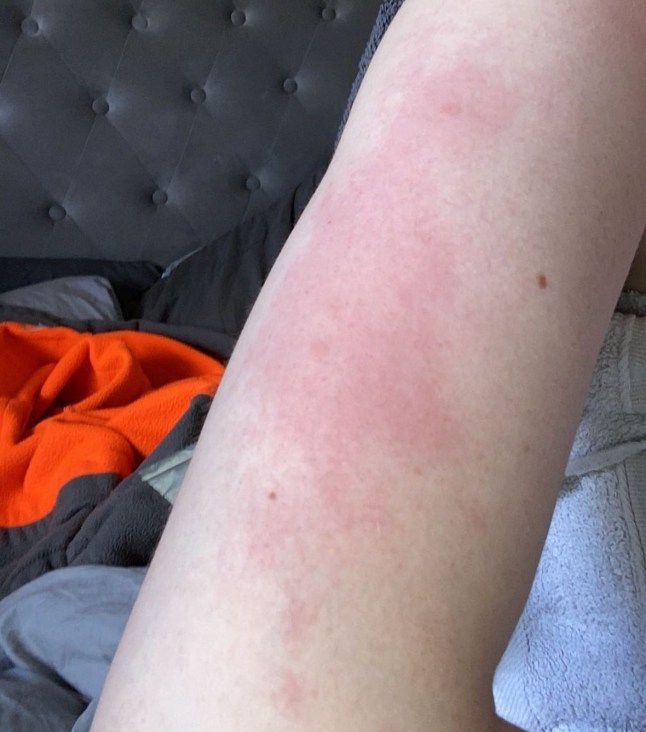24 Nov, 2025 | Admin | No Comments
Photos reveal ‘horrendous’ reality for girl who sweats three litres a day


When Darcie Hamilton was 10, she noticed she was sweating more than anyone else at her primary school.
But this wasn’t an isolated incident, as she grew older her sweating became a serious problem, forcing her to take drastic measures.
This included bringing three changes of clothes to school as well as taking up to five showers every day.
It wasn’t until Darcie was 16 that doctors finally diagnosed her with ‘one of the worst cases’ of hyperhidrosis they’d seen – a medical condition in which a person sweats excessively.
And shocking photos have revealed the side effects and ordeal she went through when her condition was at its worst at school.
‘School was absolutely horrendous for me,’ Darcie, who lives near Ayr, Scotland, recalls. ‘The condition was one of the things that I got severely bullied for.
‘I had to leave school at 14 because that’s how bad the bullying was from it. They would say I was dirty.’

It’s something that ‘definitely affected’ her, and no matter what she did, the side effects only got worse.
‘The sweat would literally be from the top of my armpit all the way down to the bottom of my waist,’ Darcie, now 22, says.
‘I was going to the school in the winter without a jacket just so I wouldn’t sweat. The older I got, the more visible it became. I would start chafing. It would cause rashes, blisters, really bad sores.
‘It overtook my life, I was in my bed all day every day. I didn’t want to leave the house or make friends. I was embarrassed.’
Darcie says she was sweating three litres of fluid every day, and as a result began downing five litres of water to curb her dehydration.
‘I’d wake up soaking in sweat no matter how cold I was,’ Darcie adds. ‘I’d wash my hair then hours later it would be soaking in sweat and I’d need to wash it again.
‘Sometimes I’d be showering maybe four or five times a day and bringing two or three changes of clothing as well. I had to bring changes of clothes to school. If I go out, even just for a walk, sometimes I have to change two or three times a day.’

She’s binned thousands of pounds worth of clothes after only being able to wear an item twice, because her excessive sweat had ‘destroyed’ it.
‘It really affected my confidence,’ Darcie says. ‘The hyperhidrosis caused contact dermatitis because of the constant sweating.
‘The sores in my armpits and hands were excruciating, and I would get hundreds of tiny blisters on both hands.’
After getting her hyperhidrosis diagnosis in 2019, doctors told her it was ‘one of the worst cases’ they’d ever seen.
Initially, Darcie was given NHS-funded botulinum toxin (colloquially known as Botox) injections for her hyperhidrosis, but received a letter earlier this year to say the treatment was being withdrawn from University Hospital Ayr.
Excessive sweating (hyperhidrosis)
Excessive sweating can happen for no obvious reason, because of another condition you may have, or as a side effect of a medicine you’re taking.
To avoid making it worse, don’t do the following:
- Wear tight clothes or synthetic fabric like nylon
- Wear enclosed boots or sports shoes
- Drink alcohol or eat spicy food
If there’s no obvious cause for your sweating, and nothing seems to be helping, then you may be referred to a specialist (dermatologist).
They may recommend other treatments that you can try, such as:
- taking tablets that reduce sweating
- treating the areas with a weak electric current passed through water or on a wet pad (iontophoresis)
- having botox injections for sweating under the armpits (this may not be available on the NHS)
- surgery – for example, removal of the sweat glands
Source: NHS
The letter states the removal of treatment is due to a number of vascular consultant retirements and a national shortage of vascular consultants. This means the health board has consequently had to ‘prioritise acute and urgent care’ for remaining surgeons.
‘I was devastated when they cut the treatment,’ Darcie says. ‘I opened the letter and just balled my eyes out crying. I felt so defeated.
‘When I got my first Botox injection, it did last the full year and I had no symptoms – no blisters, no sweating. I felt great in myself.’

She now has to pay to have the injections privately and says she does still struggle with sweating, but not to the extent she did before.
‘Because the Botox is wearing off, you start feeling the dread again,’ she adds. ‘It’s something I think I’ll have to deal with for the rest of my life.’
The 22-year-old doesn’t believe hyperhidrosis is taken seriously as a real medical condition.
‘I think people see someone sweating and think they’re disgusting and don’t clean themselves,’ she explains. ‘But it’s a real medical condition and there’s real people living with it.’
Vicki Campbell, director of Acute Service at NHS Ayrshire & Arran, commented on the withdrawal of the injections, saying: ‘Vascular services in NHS Ayrshire & Arran are delivered as part of a network arrangement with NHS Lanarkshire and NHS Dumfries & Galloway.
‘Despite attempts to recruit, there are currently vacancies in the network’s consultant establishment which is representative of a national shortage of vascular surgeons.’
Vicki explains the National Referral Protocol – a framework for identifying and referring individuals to the appropriate services – was published in September 2025, and supersedes the Exceptional Referral Protocol.

The Exceptional Referral Protocol is a set of rules for procedures not routinely available through the NHS, because they are primarily for cosmetic reasons and do not treat an underlying disease. These referrals are only granted on a case-by-case basis if there is clear evidence that the patient will experience significant benefit.
‘The NRP sets out NHS Scotland-wide criteria for the treatment of a number of conditions,’ Vicki adds. ‘Under this guidance, Botulinum toxin for hyperhidrosis is not routinely provided by NHS Scotland.
‘As a result of the above, consultant time requires to be prioritised for the provision of acute and urgent vascular care.
‘We would like to take this opportunity to apologise to any patient that this may affect. Due to patient confidentiality, we are unable to comment on individual cases.’
Do you have a story to share?
Get in touch by emailing MetroLifestyleTeam@Metro.co.uk.
Write Reviews
Leave a Comment
No Comments & Reviews